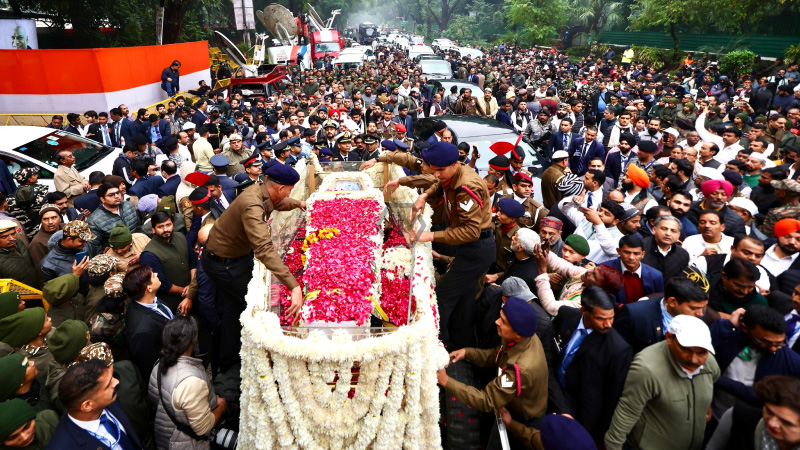- Dr. Manmohan Singh, former Prime Minister of India, passed away at 92, with last rites performed at Nigambodh Ghat, New Delhi.
- A seven-day national mourning period and half-mast flags mark the nation’s grief.
- Leaders across political and global arenas pay heartfelt tributes to his legacy.
Dr. Manmohan Singh, who served as India’s 13th Prime Minister from 2004 to 2014, was laid to rest with full state honours at Nigambodh Ghat, New Delhi.
The solemn occasion witnessed the presence of top political leaders, including PM Narendra Modi, Congress President Mallikarjun Kharge, and the Gandhi family.
Nation Mourns the Loss of Visionary Leader Dr. Manmohan Singh
Global leaders also mourned his passing, with U.S. President Joe Biden calling him a “true statesman” whose vision strengthened international ties. Tributes poured in from Singapore, which lowered its national flag as a mark of respect. Dr. Singh’s immense contribution to India’s growth story, both as a policymaker and Prime Minister, has left an enduring legacy.
Born in 1932, Dr. Singh’s illustrious career spanned academia, policymaking, and governance. His tenure as Prime Minister marked significant advancements in healthcare, education, and rural development. Beyond politics, his integrity and humility made him a revered figure.
Leaders across party lines, including Sonia Gandhi and Amit Shah, united to pay their respects. The Congress, his political home, commemorated him as a symbol of unwavering dedication to public service. International figures, including Singapore’s High Commissioner, expressed deep sorrow over his passing.
Dr. Singh’s final journey has sparked discussions about his enduring legacy, including a proposed memorial. His ability to bridge political divides and his visionary reforms remain a benchmark for leadership in modern India.
Dr. Manmohan Singh’s legacy as a scholar, statesman, and reformer will continue to inspire generations. His contributions have cemented his place in India’s history.
“Leadership is not about wielding authority; it’s about empowering people to achieve greatness.” — This reflects Dr. Singh’s visionary



